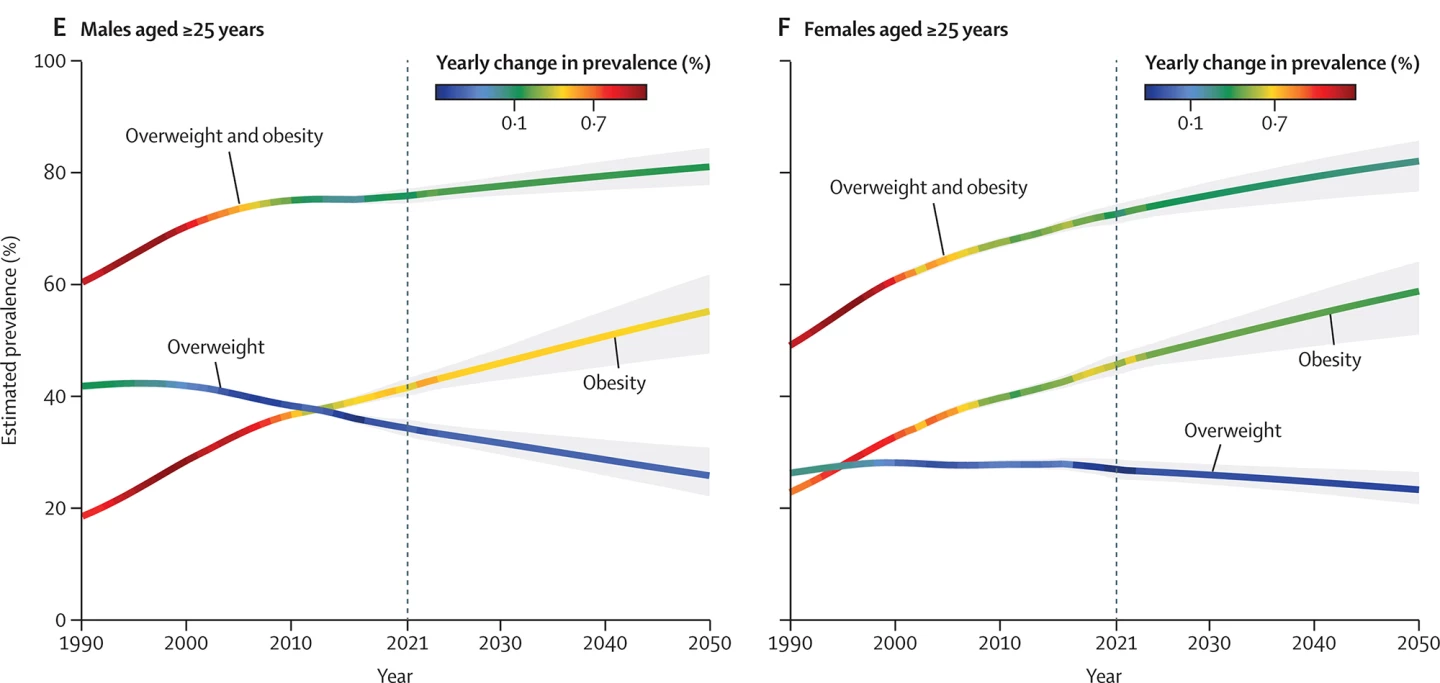Nearly half of US adults admit they’d take one of the newer, injectable weight loss drugs, but that number falls significantly when they learn that the weight might come back when the meds are stopped. It’s indicative of a pattern of people discontinuing their weight loss drugs, and it’s something that has medical professionals concerned.
The US has one of the largest overweight or obese populations in the world, and rates continue to rise. According to a study published in the renowned medical journal The Lancet, across all 50 states and Washington, DC, in 2021, the prevalence of overweight and obesity was over 40% in both sexes combined, which contributes substantially to the overall health and mortality rates of Americans.
Semaglutide, first marketed as a diabetes drug (Ozempic) and then as a weight loss treatment (Wegovy), has blazed onto the scene, garnering mass popularity along the way due to its ability to cause rapid weight loss. Studies have found that, in addition to reducing weight, the drug also reduces the risk of cardiovascular events in diabetics and overweight non-diabetics and chronic kidney disease due to diabetes.
While semaglutide and other glucagon-like peptide-1 receptor agonists (GLP-1 RAs) are intended to be used long-term to manage the chronic conditions of obesity and diabetes – and alongside lifestyle changes like a healthy diet and increased exercise – a recent poll has found that many Americans are discontinuing them. And, the main reason they are is an interesting one.

A July 2023 poll conducted by the independent health research organization KFF, formerly The Kaiser Family Foundation, found that almost half of US adults, 45%, would “generally be interested” in taking a safe and effective weight loss drug. However, that number dropped substantially to 14% when they learned they might regain the weight after stopping the medication. The drop was associated less with other reasons, such as if the drug required routine injections (23%) or it wasn’t covered by insurance (16%).
KFF followed up their health tracking poll on GLP-1 RA drugs in May 2024. Compared to 2023, public awareness of the class of drugs had risen from 19% the previous year to 32%. About one in eight American adults, 12%, reported taking a GLP-1 RA, including 6% who still were. Most adults who’d taken a GLP-1 RA said they’d taken it for a chronic condition, including diabetes or heart disease (62%), while about four in 10 said they took the drug primarily to lose weight.
A little over half (54%) of all adults reported difficulty affording the cost of GLP-1 RAs, including 22% who described it as “very difficult.” Even about half (53%) of insured adults who said their insurance covered at least part of the cost said it was difficult to afford. But, the figure remains: 12% of Americans were taking a GLP-1 RA despite the cost. And that 12% included 43% who’d been told by a doctor they had diabetes, 25% who had been told they had heart disease, and 22% who’d been told they were overweight or obese in the past five years.
A study led by the Evernorth Research Institute, Missouri, into the discontinuation of GLP-1 RAs by patients with obesity and/or type 2 diabetes was published in JAMA Network Open, around the same time KFF released its 2024 poll results. The study looked at data from 195,915 individuals between January 2021 to December 2023, of which 58.9% were female. The overall prevalence of discontinuation of GLP-1 drugs at three, six, and 12 months was 26.2%, 30.8%, and 36.5%, respectively. Patients with obesity only at the beginning of the study period had a higher prevalence of discontinuation at 12 months (50.3%) compared to those with only type 2 diabetes (35.8%) and those with both conditions (34.2%). Additionally, the odds of discontinuing the drugs were higher if the patient was Black or Hispanic, male, and an enrollee of Medicare or Medicaid.

“The staggeringly high discontinuation rates of GLP-1 RA should raise alarms for clinicians, policy makers, and public health experts,” said Dr Sadiya Khan, an associate professor of cardiology and preventive medicine at Northwestern University Feinberg School of Medicine and a practicing physician at Northwestern Medicine. Khan is also the lead author of an opinion piece that was published in JAMA in mid-November, written in response to the Evernorth study and KFF’s 2023 and 2024 poll data.
“While research is needed to quantify and identify the drivers, we hypothesize that there are likely many issues,” Khan continued. “First and foremost, the high cost of these therapies is likely a large barrier. Also, unlike therapies that are used to treat blood pressure or cholesterol, the perception that these are not chronic disease therapies may also be contributing. For instance, some individuals think they will stop taking them once they’ve lost weight while others are only using them cosmetically and not for management of a chronic disease.”
The authors of the opinion piece say that the findings that a lot of people stop taking GLP-1 RA drugs within a year need to be discussed more, especially in light of the benefits they provide to cardiovascular health.
“Newer, high-potency GLP-1 RAs have revolutionized the therapeutic landscape for patients living with overweight, obesity or diabetes,” said Khan. “In addition to the highly publicized weight benefits, these drugs, like semaglutide, have given the magnitude of benefit with a 20-25% reduction in cardiovascular disease events regardless of weight loss achieved.”
At the end of the day, what remains is the US’s obesity problem. The Lancet study referred to at the beginning of this article projects that a staggering 81.1% of adult males and 82.1% of adult females will be overweight and obese by 2050. Overweight and obesity need to be treated safely and effectively to avoid that worrying forecast.
Source: Northwestern University








